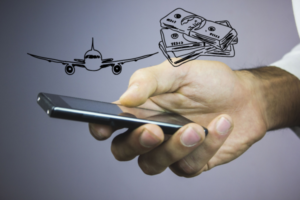With the world opening up from the pandemic, we’re swapping our houses and webinars for airports and workshops as work-related training, seminars and networking moves back to a face-to-face format. Given that it’s been a number of years since it was common to travel for these sort of work related activities, we thought it would be timely to review tax deductions that may be available for your work-related training.

Work related training and self-education
It is worth distinguishing between work related training and self-education costs, as there is a specific part of the tax return for claiming self-education costs. Training, professional development and seminars are general work related costs or business costs for a sole trader/business operator. Self-education is considered as a course undertaken in the course of being an employee to get a formal qualification from a school, college, university or other place of education. Self-education is not the focus of this piece.
Tax deductible training costs
Generally, you can claim the cost of attending seminars, conferences or training courses as a tax deduction if these courses will increase your knowledge, capabilities or skills that you need to earn your income in your current employment or business activity.
Example 1
Mackenzie is a myotherapist who utilises dry needling in her treatments. She enrols in a five day course in cupping to broaden her range of modalities available to treat patients. Cupping is commonly used amongst myotherapists and enhances her skills that are already being used to treat pain and offer corrective treatment. The cost of this course is tax deductible, along with any stationary and text books required to complete the course.
Example 2
Mackenzie feels like a lot of patients she sees are under elevated stress and this is compromising their physical and mental health. She undertakes a part time degree in psychology with a view to attaining a formal qualification and then specialising in stress relief and management. These course fees are not tax deductible, as they relate to an income earning activity that is not closely related enough to her existing business activities.
Although the psychology qualification will allow her to treat patients and improve their wellbeing, she is expanding into a new area of study, qualification and expertise which does not come under the umbrella of her existing profession, qualifications and modalities as a myotherapist.
Travel, accommodation and meals
This is an area of particular interest for any conferences and seminars that occur interstate or overseas. If someone travels alone directly to a conference and pays to stay and attend said conference and then head home, it is very simple; these costs are deductible. The travel would include airfares and taxi/car/public transport costs as required.
Further consideration is required if anything other than this occurs, which would commonly be either family attending the conference, or a non-work related holiday being taken before or after the conference.
If you add non work-related travel or accommodation to your conference trip, you can only claim the direct costs of attending the conference and the private/non-work component of any costs cannot be claimed as a deduction.
Deductibility of travel costs, mainly airfares, are dependent on the purpose of the travel. The current view of the ATO is that if the travel was predominantly for work related purposes, then the airfares are claimable. This would be where any sightseeing or non-work related activities are incidental to the whole trip. Conversely, if the conference is a minor part of the trip and it is more predominantly a holiday, then none of the airfares are claimable.
Accommodation and meals are more straightforward, as you can allocate what directly relates to the conference or not. If you spend 8 nights in a hotel and 6 of those nights relate to a conference, then 6 nights of your accommodation are deductible and all other accommodation is not deductible.
Some other common questions:
- What if my costs are reimbursed? You cannot claim a deduction for costs that are reimbursed by your employer or anyone else.
- What if I receive a travel allowance from my employer? This is a separate topic altogether, but if you receive a general travel allowance, then this can be included in your income and you can claim relevant costs against it. See some further comments below under record keeping.
- Can I still deduct airfares if I travel business or first class? Yes. It is not up to the Commissioner of Taxation to decide how much you need to spend in running your business. But it is up to the Commissioner to decide if those costs are deductible. And it is always valuable to keep in mind that you should never spend money to chase tax deductions.
- Can I claim the cost of travel insurance? No. The ATO has determined that this is not a tax deductible cost.
Record keeping
Receiving a travel allowance as an employee is mentioned above. In that scenario, the ATO publishes an annual ruling which sets out ‘reasonable amounts’ that can be deducted without keeping the source documentation. The ATO guide on what it considers reasonable amounts to claim for food and drink and accommodation in some cases will vary depending on your:
- Annual salary
- Location of travel for work, and
- In some instances, your occupation
Although this guide relieves you of substantiation to the highest level, you still need to have spent the money in the first place to claim the reasonable amount. You can also claim more than the reasonable amount if you retain all of your receipts. As noted, this is only applicable to employees, not sole traders and business operators.
Finally, as with any tax deduction, it is important to keep records regarding expenses that were incurred during your travel. This includes tax invoices from airlines and accommodation providers, receipts for meal expenses, and your workings on how expenses were apportioned between work-related travel and personal travel if necessary. The ATO states that if work related travel exceeds 6 consecutive nights a travel diary should be maintained to supplement the receipts and invoices and prove the work related parts of the trip.
If you have any questions about travel expenses and what you can or cannot claim, we recommend you reach out to an Accru Advisor who can provide specific advice for any work-related travel you have planned in the future.
